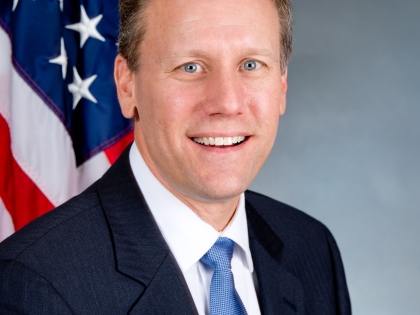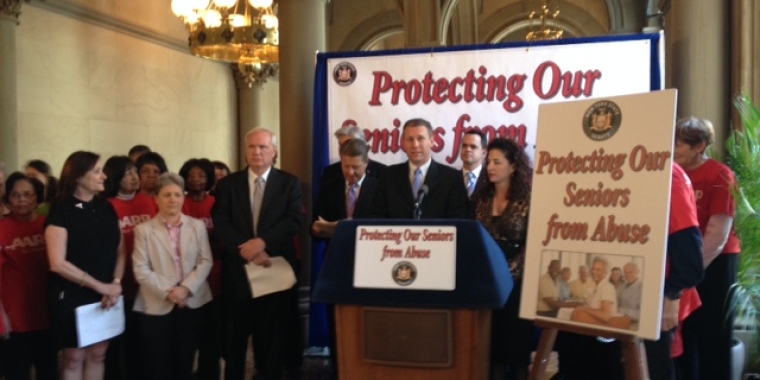
Senators Valesky and Gallivan Release Report Exposing the High Prevalence of Elderly Abuse and Exploitation in New York State
David J. Valesky
May 6, 2014

Legislators Propose Preventative Measures that Include Providing Banks the Authority to Reject Deceptive Financial Transactions
ALBANY, NY - Today, Senator David Valesky (D-Oneida) and Senator Patrick Gallivan (R-Elma) released an extensive report that shows financial abuse amongst New York's seniors to be more prevalent than initially thought, with much higher rates of undocumented incidents that actually exist. Data obtained by the New York State Office of Children and Family Services project a surge in the number of cases of financial abuse by the year 2030, with nearly 200,000 incidents predicted to occur.
The number of incidents involving elder abuse correlate with statistics that show a significant increase in New York's senior population, which is the third most populous in the United States. Unfortunately, these incidents often times go unreported due to the startling fact that the abuser is someone that the victim either trusts, is a caregiver, or more often than not, is a family relative.
Seniors tend to be vulnerable to certain degrees of financial abuse, including theft, concealment of funds, or even property. Yet while they possess adequate financial assets, they lack the capability to manage these items as they age and begin to suffer cognitive illnesses, such as Alzheimer's or dementia.
Senator David Valesky, Chairman of the Senate Aging Committee, said: “The prevalence of elder abuse in all forms, especially financial, is increasing as our senior population grows. It is incumbent upon us to ensure that there are laws on the books to protect seniors and give law enforcement the tools they need to prosecute offenders.”
Senator Patrick Gallivan, Chairman of the Senate Crime Victims, Crime and Corrections Committee, said: “Our seniors deserve our respect and our protection. As a former New York State Trooper and Sheriff of Erie County, I believe we must do everything we can to guard against all forms of elder abuse, whether physical, psychological, or financial. This legislation will make sure these despicable acts do not go unpunished.”
Over the years, there has existed a wide array of types of financial abuse that are targeted towards seniors. These include scam solicitations via robo-call advertising or using other modes of communication such as the internet. While there are many law enforcement agencies and nonprofit organizations that conduct their own investigations into crimes committed relating to elder abuse, there is no single institution that collects all data incidences of elder abuse statewide.
In addition, New York State lacks a statutory definition for prosecuting elder abuse. Instead, it relies upon separate definitions under the New York State Social Services Law. One pertains to “adult abuse” for individuals over the age of 18 who may be dependent on someone else, while another, “financial exploitation,” deals with the improper use of ones funds, property, resources, and so forth.
According to one study referenced in the report, Under the Radar: New York State Elder Abuse Prevalence Study,while documented cases provided by agencies amounted to 3.24 cases per 1,000 seniors in 2010, researchers concluded that the actual caseload of abuse was, in fact, much higher. When using self-reported data collected, researchers estimated that the total amount was actually closer to a rate of 76 per 1,000. In other words, nearly 280,000 seniors experienced at least one type of abuse during that year, with about 155,000 facing financial abuse alone.
Rates of Elder Abuse in New York State: Comparison of Self-Reported One-Year Incidence and Documented Case Data
| Documented Rate per 1,000 | Self-Reported Rate per 1,000 | Ratio of Self-Reported to Documented |
NYS – All forms of abuse | 3.24 | 76.0 | 23.5 |
Financial | 0.96 | 42.1 | 43.9 |
Physical and Sexual | 1.13 | 22.4 | 19.8 |
Neglect | 0.32 | 18.3 | 57.2 |
Emotional | 1.37 | 16.4 | 12.0 |
Legislative Action to Combat Widespread Abuse
In order to combat these rising trends and to protect even more elderly individuals from becoming future victims themselves, Senator Valesky and Senator Gallivan propose a package of legislation that will, among other things: (1) prevent deceptive financial transactions from taking place, (2) update collection of data methods to track abuse statewide, and (3) amend existing law to stiffen penalties to deter criminal acts from occurring in the first place.
· S.6221 (Senator Valesky) authorizes banks to refuse any transaction of moneys if the banking institution, social services official, or law enforcement agency reasonably believes that financial exploitation of a vulnerable adult has occurred or may occur.
· S.7179 (Senator Valesky) proposes to allow a prosecutor to obtain medical records, without a privilege waiver, with a subpoena, endorsed by the court, based upon a showing that the patient suffers from a mental disability, and that the patient has been a victim of a crime.
· S.2951 (Senator Valesky) expands the definition of “caregiver” under the penal law to include a person who voluntarily, or otherwise by operation of law (such as an appointed guardian or power of attorney), assumes responsibility of an elderly person so that they would be tried under the “endangering the welfare of a vulnerable elderly person” law.
· S.2323-A (Senator Klein) requires the Office of Children and Family Services to define, identify, and collect data related to the incidence of elder abuse possessed by state and local agencies. It also mandates the Office of Children and Family Services to establish an inter-agency reporting system that contains a uniform set of standards to collect and analyze information on the incidence of elder abuse.
· S.7177 (Senator Gallivan) seeks to establish that an alleged abuser may not use the defense of obtained consent to take, withhold, or obtain property, where such consent was obtained from a person whom the accused knew or had reason to know was mentally disabled.
· S.7187 (Senator Nozzolio) amends the penal law to explicitly state that in a prosecution for larceny by false promise, partial performance does not, by itself, prevent a reasonable jury from making such finding from all the facts and circumstances.
· S.7188 (Senator Nozzolio) would allow a caregiver to accompany a vulnerable elderly person who is testifying in front of a grand jury. The caregiver may only fulfill their function with the consent of the prosecutor.
· S.7178 (Senator Gallivan) allows the prosecution and defense attorneys to preserve the testimony of witnesses who are age 75 or older.
“Financial exploitation of older New Yorkers is a huge and growing problem – and far too often goes unreported,” said Beth Finkel, State Director of AARP in New York State. “As society ages and people live longer, it’s only going to get worse if left unaddressed. These bills take the right approach by identifying the extent of the problem, preventing potential abuse, encouraging victims to come forward, and cracking down on abusers. AARP commends the leadership of Senators Klein, Valesky, Gallivan, and Nozzolio for tackling elder financial exploitation, which can rob older New Yorkers of their life savings.”
Ann Marie Cook, President and CEO of Lifespan said: “One of Lifespan’s primary objectives has always been to protect older New Yorkers from all types of abuse. Whether it’s physical, psychological, or financial we will work every day to protect our parents, family, friends, and neighbors,” Ann Marie Cook, President and CEO of Lifespan said. “These are critical pieces of legislation that will help older New Yorkers and their families enjoy their golden years together.”
Bobbie Sackman, Director of Public Policy, Council of Senior Centers and Services (CSCS), stated, “Council of Senior Centers and Services is pleased to stand with state legislative leadership and support its package of bills addressing the hidden crisis of elder abuse. The daunting fact that 260,000 older New Yorkers statewide experience physical, psychological, sexual, and financial abuse that goes unreported, and the nature of these heinous crimes cries out for the state to intervene to protect elder abuse victims. This package, which confronts financial elder abuse by partnering with banks to expedite reporting suspicious activity, includes caregivers who are trusted by the victim in criminal law, and directs the state to establish a central data base of elder abuse and neglect, shows a strong commitment to meeting this crisis head on. CSCS looks forward to winning the enactment of this package of bills. The lives of thousands of elder abuse victims depends on it.”
Laura Cameron, Association of Aging, said: “The Association on Aging in New York applauds efforts by Senator Valesky and Senator Gallivan to address the growing problem of elder abuse,” said Laura Cameron, Executive Director of the Association on Aging in NY. “Our members, the local offices for aging, are on the front lines every day serving the needs of our older population, and we welcome the support of our state legislative leaders who understand the importance of protecting older New Yorkers so they can successfully age in place with both dignity and independence.”
Maria Alvarez, Executive Director, New York StateWide Senior Action Council: “New York StateWide Senior Action Council has been a supporter of the mandatory reporting of elder abuse, whether it be financial or otherwise. In addition, we think that in order to ensure that these policies are implemented properly, funding must be allocated to training professionals that work with senior citizens such as bank workers, police and law enforcement personnel, as well as others in the business and social services fields.”
Share this Article or Press Release
Newsroom
Go to NewsroomTHE BATTLE FOR THE STATE SENATE
April 17, 2014
Manufacturing Investment in New York State
April 17, 2014